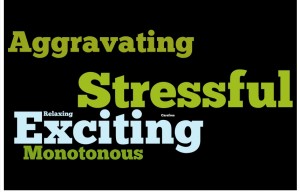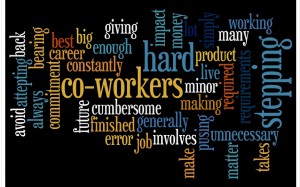I presented a survey asking people how satisfied they are with the current job or career they have. I wanted to find out if most people are working some place they are unhappy, and what their motivation is for not leaving. A total of 25 random people answered the six question survey, most of whom are in their early twenties.
There is one overall contradiction I noticed from the results. The first question asked people to rate how satisfied they are with their job on a scale of 1 to 5, with 5 indicating the most satisfaction. Most respondents, (88 percent) gave their answer in the middle ground, meaning they answered with a 3 or 4 on the satisfaction scale. Not one respondent answered they were completely unhappy with their job.
The next question asked people to choose words that describe their job from a set of adjectives. Here is where I noticed a contradiction between the answers given for this question, and those given to the first.
Most respondents (62 percent) used the word “stressful” to describe their job.
The same respondents also used the adjectives “aggravating,” “exciting,” and “aggravating.” Although “exciting” was used often, there appears to be a lack of enthusiasm respondents showed for their occupation. Because of this, more people should have responded that they were unsatisfied with their job, instead of replying they were satisfied or more.
What was not surprising from the results, however, was the reasons respondents gave for not liking their job. The next question asked respondents to pick from a number of reasons for not liking their job, such as not liking their boss, having unpleasant co-workers, or doing too much work for not enough pay. Thirteen (52 percent) answered that the pay isn’t good enough and the work is too much.
The image below shows the most common pairing of words respondents used to answer this question.
The survey also asked respondents if they would take a job they absolutely hated just because the pay was high. The choices were “yes,” “no,” or “maybe.” The point of this question was to find out if money could be a strong enough motivation for people to pursue a job. I expected most of the answers to this question to be “yes.” The results showed that most people answered “maybe” (62 percent) instead of a complete “yes.”
Considering the amount of people who said their salary wasn’t high enough, I was surprised that more people did not respond with a complete “yes.” To find out why, I would follow-up and ask the respondents why they chose “maybe” instead of “yes.” I would also ask why they did not choose “yes” for a higher paying job if their current “aggravating” and “stressful” job does not pay enough.
In the survey I included a qualitative question for respondents to give their personal reasons for disliking their job. The image below shows the most common words people used in their responses, with the largest ones being used the most.
Again, most people expressed dissatisfaction with the jobs they have. But it seems that though they are unhappy, people choose to stay with their jobs because they believe there is nothing better out there.

